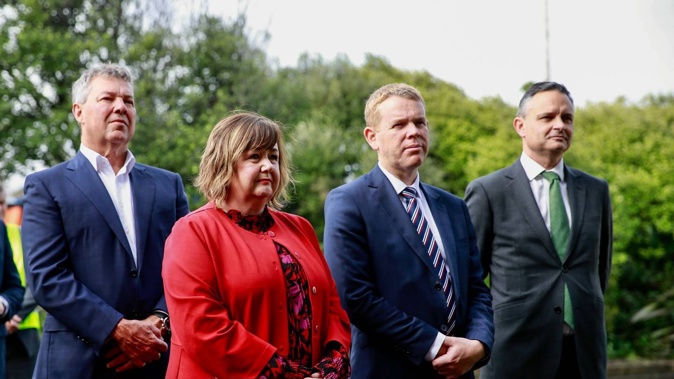
Housing Minister Megan Woods has written a second letter to the National Party in a bid to save the Labour-National housing accord, which National walked away from over the weekend.
Woods said she had already heard reports of developers putting “projects on ice” as a result of the uncertainty created by National walking from the deal.
“We’re talking 400 to 500 affordable first homes that are now put on hold because the National Party has broken what we had, which was some bipartisanship,” Woods said.
National leader Christopher Luxon and housing spokesperson Chris Bishop said they would meet with Labour, although they had not replied to the letter by the time they went to their caucus meeting on Tuesday morning.
Luxon said Labour’s olive branch was evidence the policy was flawed.
“She is conceding, as Chris Hipkins is as well, that this isn’t working,” Luxon said.
He said he was open to Labour compromising by adopting National’s policy.
“We would love to sit down with them and do a bipartisan deal on our policy,” Luxon said.
“We have a great policy and we think it would be fantastic in the spirit of bipartisanship for them to adopt it,” he said.
Hipkins said Labour’s “first preference” would be to speak to National, but he was open to looking at the policy independent of National if the party refused any bipartisan agreement.
He said the Government wanted to provided certainty on the rules to developers.
“One of the reasons that we worked with the National Party on this though and their request was because we believe it provides more certainty to the market and ultimately, that’s going to speed up house building more uncertainty in the market, which is what the National Party have now created is likely to slow down housebuilding,” he said.
At the heart of the accord was the Medium-Density Residential Standard, which allowed the building of three three-storey townhouses on almost all residential land in main cities without a resource consent, meaning the new buildings would be very difficult for councils or neighbours to block.
Modelling done by PwC before the MDRS went to select committee found the new standard would add 48,200 to 105,500 dwellings over the next five to eight years.
National has proposed making councils’ adoption of MDRS optional, however councils would be required to immediately bring forward 30 years of housing supply. They could achieve this target by sticking with the MDRS, or freeing up greenfield land on city fringes, or a mixture of both.
It is not clear where there would be room for compromise. Woods said she was unsure about National’s proposal to immediately zone for 30 years of housing, saying this would be unaffordable.
“I’m still not sure what exactly they mean when they’re going to say they’re going to make 30 years of zoned land buildable. By my back of the envelope calculations that’s tens of billions of dollars of infrastructure that is required as soon as that is put into place,” Woods said.
National’s housing spokesman Chris Bishop said Woods had misunderstood the policy, and that new infrastructure for greenfield development would be paid for by targeted rates on those developments.
“The beneficiaries of the growth of the people moving into new housing, new Greenfield housing development will have to pay for the infrastructure by way of a targeted rate or a levy over 30 years,” Bishop said.
Former National leader Judith Collins, who led the accord when she was leader said that “every policy can be improved”.
“Even excellent policies can still be improved - everything can be improved because things move on,” Collins said.
Take your Radio, Podcasts and Music with you









